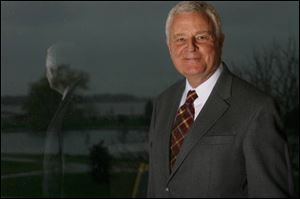
State park director s departure big loss
12/4/2006
Speck
As Ohio Department of Natural Resources director, Sam Speck left his mark on northwest Ohio.
During his tenure, the Ohio DNR improved boater access to the Lake Erie islands, laid the groundwork for a historic water-usage compact among the eight Great Lakes states, and worked with other state and federal agencies to develop the Conservation Reserve Enhancement Program.
The latter is an incentive-laden program to help keep sediment out of Lake Erie tributaries, including the Maumee, Sandusky, Portage, Huron, Vermilion, and Black rivers.
Mr. Speck, who leaves office at the end of the year, is a moderate Republican known for his affable demeanor and cool-headed negotiating skills.
He cited less-visible accomplishments, such as better toilets, more sewer hook-ups, and more electricity at Ohio s 74 state parks.
The DNR, with money generated by the Clean Ohio Fund, also added 220 miles of trails and 20 miles of right-of-way, he said.
Mr. Speck praised the state park system for making the best of a thin budget.
Though Ohio spends $196 million a year on its parks, many managers oversee more than one facility and maintain them with fewer employees all while Ohio is third behind California and New York in usage.
He said he was disappointed by the backlash he received for his 2005 plan to charge $5 for daily fees and $25 for seasonal passes.
Ohio legislators nixed the proposed fees.
The plan was not as crazy as it seems, given that 46 other states have fees, Mr. Speck said.
He earned kudos for defending the public s right to stroll along the Lake Erie shoreline.
When the Ohio House voted to abandon the public s right to stroll the Lake Erie shore, Sam Speck drew a line in the sand and stood up for the little guy, Jack Shaner, Ohio Environmental Council spokesman, said. Kids who aren t even born yet and who walk that shore one day will forever owe him a debt of gratitude.
Mr. Speck s impending departure is a big loss not just for Ohio s conservation community, but for all of Ohio, Mr. Shaner said.
Mr. Speck is chagrined the debate remains largely unresolved. He said it was intensified by receding water levels as beach walkers clashed with private property owners over newly exposed land.
He said he has been disappointed by Ohio General Assembly cutbacks in recycling programs and its reluctance to strengthen mining regulations.
But Mr. Speck is proud of what he accomplished for Lake Erie, including deals totaling more than $35 million to buy and develop land on North and Middle Bass islands. Those kind of opportunities only come along once, he said.
In April, 2004, the state paid $17.4 million to buy 589 of the 676 acres on North Bass, or 87 percent of the island.
A state park is being developed there. In 2001, the state paid $6.75 million for 124 acres on Middle Bass, including the former Lonz Winery, for the same purpose. Three years later, it acquired 17 more acres to expand the Middle Bass marina and make related improvements there at a cost of $11.4 million.
Those projects are part of a master plan for conceptually linking North, Middle, and South Bass islands with Kelleys Island and Catawba Island. The state DNR wants the islands to be collectively thought of as a single entity called Lake Erie Islands State Park.
Mr. Speck served as Gov. Bob Taft s point man in negotiating the proposed Great Lakes-St. Lawrence River Basin Water Resources Compact with seven states. That happened while Mr. Taft was chairman of the Council of Great Lakes Governors from June, 2001 through December, 2005.
Mr. Speck chaired a working group empaneled for those negotiations.
The proposed compact, subject to ratification by Congress, would assert regional control over the lakes. Some feel the compact could be worth billions as the Earth s climate rises and its population expands.
Mr. Speck chaired the Great Lakes Commission in Ann Arbor, the chief advisory body for the region s eight states. He is chairman of the Ohio Lake Erie Commission, the state s policy board for the lake.
Sam is one of the most effective leaders the Great Lakes have had in decades. He s been a passionate advocate, a hard-nosed negotiator, a tireless worker, and a pragmatic fix-it guy for the lakes, said Andy Buchsbaum, director of the National Wildlife Federation s Great Lakes office.
George Kuper, president and chief executive officer of the Council of Great Lakes Industries, said Mr. Speck has been a wonderful guy to work with on Great Lakes issues.
He s patient. He clearly listens and brings out good things in people, he said.
Mr. Speck, 69, grew up on a Stark County farm. He was an avid stone collector as a kid, tickled that he once got an article published in Rocks & Minerals magazine.
He was a legislator from New Concord, first a state representative from 1971 to 1976 and then a state senator from 1977 to 1983. He was the primary author of Ohio s Strip Mine Reclamation Act.
Mr. Speck received his master s and doctorate degrees from Harvard University. Under President Ronald Reagan, he served as associate director of the Federal Emergency Management Agency.
His undergraduate degree is from Muskingum College. Mr. Speck went back to that campus in 1988 as president. He was hired away as DNR director by Mr. Taft in early 1999.
Mr. Speck said he and his wife Sharon, 68, have been adjusting to a rare condition that has left her nearly blind. Bicycling on a tandem has become one of their favorite activities, he said.
The two live in Worthington. Their 45th anniversary is in January. They have two son, Sam III, a veterinarian in Elyria,, and Derek, a development director in Tukwila, Wash.
Contact Tom Henry at: thenry@theblade.com or 419-724-6079.